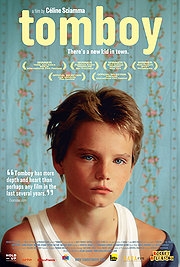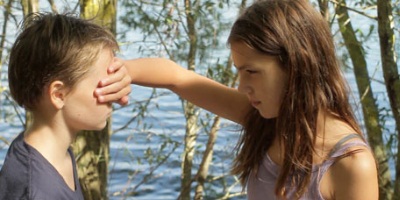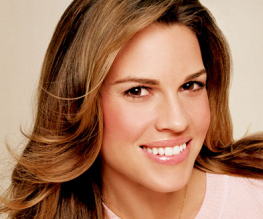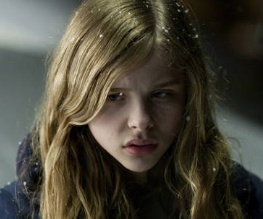Tomboy

I don’t think I have ever felt so tranquil at the pictures as I did during Tomboy; a 4pm showing time meant that I had the entire screen to myself, leaving the experience utterly devoid of the usual murmurings, coughing fits, crunching popcorn and the sound of ice cubes rattling in a too-huge fizzy drink. The silence was eerie; however, as soon as Jean-Baptiste de Laubier’s lilting opening sequence filled the air, I completely forgot where I was. I was suckered in.
Meet Boys Don’t Cry‘s little French cousin. Zoé Héran is Laure, a young tomboy who has moved to a new neighbourhood with her family. Awkward and shy, she spends most of her time looking after her adorable younger sister Jeanne (Lévana) so that her heavily pregnant mother can rest up. She doesn’t want the baby to “slip off”, as little Jeanne puts it bluntly. So when Laure meets Lisa (Disson) and is mistaken for a boy, she decides to go along with the pretence and dubs herself Michaël. Cue a summer of fun in her new persona, playing football and spitting and swimming in briefs to her heart’s content and yet, as school and adolescence approaches, we see the lie spiral out of control and lead to a painful, yet oddly uplifting, conclusion.
I suppose it was the natural-feeling chemistry between the cast that made this film such a delight to watch. Céline Sciamma focuses mainly on the children and, without a shadow of a doubt, her choice to cast relatively unknown child actors who are friends in actuality was an excellent one. There is an immediate sense of ease and a carefree attitude to playtime which feels genuine. It doesn’t feel staged; it feels like we’ve just dipped a camera into playtime. Voyeurism, that’s the word I’m looking for. It’s all about the voyeurism.

Crystel Fournier is a genius; with much of the film’s action taking place outside, we are treated to a plethora of beautiful postcard worthy shots. It really helps to emphasise the fact that children are wild and unknowable little creatures. Plus, in the manner of William Blake’s Songs Of Innocence, the pure and natural seems strongly associated with innocence and childhood; this is the one place where children can be children and gender should be obsolete. However Laure’s lie taints this world and, thanks to tight shots and a very small depth of field, we feel Laure’s tension as suspicions begin to escalate.
The relationship between Laure and her sister was one of the most important in the film, despite their overwhelming contrasts; Jeanne favours ballet skirts, long curly locks and is your typical cute-as-a-button girly-girl. Laure, on the other hand, crops her hair to the nape of her neck and prefers football, shorts and trainers. The two share the secret of Laure’s identity crisis and Jeanne quickly grows accustomed to her protective big ‘brother’, showing an enchanting gender-blindness and even assisting in the deception with haircuts and play-dough penis excursions.

It goes without saying that Malonn Lévana is a star in the making. Willing to strip naked for the camera, as well as dip seamlessly into her blurred boy/girl persona, we really feel for the character and share in her claustrophobia as she comes to realise the consequences of her actions. Lying is wrong, but surely social prescriptions on gender are just as bad; why can’t a little girl spit, play football and play with little boys?
Whatever. Vive le France!





Recent Comments